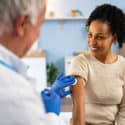
Understanding the difference between RSV symptoms and symptoms of other illnesses can be tricky, especially during peak infection seasons. MainStreet Family Care is here to educate you on these symptoms as well as RSV treatment, diagnosis, and prevention methods.
What Is RSV?
Respiratory syncytial virus (RSV) is a highly contagious respiratory illness. This virus specifically affects the lower respiratory tract and is extremely common with thousands of cases reported each year. Even if you have never had an official RSV diagnosis, it is likely you have had this virus at some point in your life.
For most adults, RSV symptoms pose more discomfort than danger. However, older adults with compromised immune systems or chronic lung disease are at a higher risk for severe infection.
Additionally, children twelve months of age and younger have an increased risk for severe RSV. If you believe you have this virus, avoid close contact with young children.
Symptoms of RSV
RSV symptoms are extremely similar to those of the common cold. Typical symptoms include:
- Congestion
- Runny nose
- Coughing
- Sneezing
- Suppressed appetite
- Trouble breathing
- Wheezing
- Fever
- Sore throat
- Headache
If you are having symptoms of RSV, MainStreet Family Care can help! We offer RSV testing and treatment in our urgent care services.
Complications Of RSV In Adults
There are other complications that may result from an RSV infection. Common complications of untreated RSV include:
- Bronchitis
- Pneumonia
- Ear infection
- Hospitalization
If you are feeling ill, it is important to treat your symptoms sooner rather than later to avoid any unnecessary complications.
How Is RSV Tested?
Testing for RSV typically consists of a simple nose swab and lab test. In some cases, providers may order a chest x-ray to more accurately diagnose the condition.
RSV Treatment Methods
There is no official cure for RSV, however, most mild cases of RSV can usually be treated with at-home methods. Some best practices include:
- Take over-the-counter pain and fever medications.
- Take cold medicine.
- Get plenty of rest.
- Drink fluids to ensure you do not get dehydrated.
Preventing RSV Infection
While not totally preventable, there are several actions you can take to prevent RSV infection for you and your family. Best practices to prevent the virus include:
- Wash your hands frequently.
- Avoid touching your nose, eyes, and mouth.
- Avoid large crowds during RSV season.
- Ensure your family gets their annual RSV vaccine.
If you have been diagnosed with RSV, try to reduce the spread as much as possible. Stay home when you are feeling ill, as well as avoid contact with others.
Turn To MainStreet Family Care
Are you struggling with RSV symptoms? Let MainStreet help you heal and feel better fast!
To visit one of our urgent care clinics, register online. You will be able to wait from your home or vehicle until we are ready to see you.
Although we love walk-in patients, we highly recommend all patients register ahead of their visit. Walk-ins are added to the same queue as those who registered online and may experience longer in-clinic wait times.






